James Fuentes Gallery
Oscar yi Hou
The beat of life
The beat of life, thuds,
slams, against my sternum
This drum: a sign of life
skirting around its negation.
James Fuentes is thrilled to present Oscar yi Hou’s second solo exhibition with the gallery, The beat of life.
Made over the past two years, the exhibition takes its title from a fragment of one of the artist’s poems and commemorates the change that has taken place over this span of time. As with the many symbols found across yi Hou’s practice, beat carries several meanings at once: beat as in being pummeled by life; beat as in the throb of nightlife; beat as in the territory delimited by a cop’s patrol. Several progressions in the artist’s practice emerge across this body of work, including his further abstraction of language from calligraphy to dot matrices and an advancement of his symbolic grammar of flames, cranes, and stars. The beat of life speaks to yi Hou’s sustained fascination with the act of painting itself—its technical, aesthetic, and social capacities.
Grounded in portraiture, yi Hou’s work engages deeply in the questions of both personhood and relation that this genre surfaces. Central to his approach is the idea of being-with, privileging the lived experience and intimate dynamics between the artist and sitter, as well as the larger historical, cultural, and stylistic contexts that each portrait takes place within and speaks back to. Yi Hou embeds an ever-evolving, interconnected field of iconography in the image, at times compositionally pronounced and, at others, illegible and almost hidden. With The beat of life, yi Hou moves towards a heightened naturalism, pared-back composition, and distilled symbolism. A renewed sensuality of the artist’s rendering of flesh, fabric, and leather imbues the image with a heightened erotic charge, transcending representation to make palpable the intimacy at hand.
Yi Hou continues his ongoing Coolieisms series, examining the ways in which East Asian-ness has figured within the West's racial imaginary and visual culture. In Coolieisms, aka: The Geary Act’s Rough Trade, yi Hou folds in reference to artistic forbearer Martin Wong’s octagonal Sacred Shroud of Pepe Turcel (1990). Tying Wong’s fetishization of criminality with the longer history of persecution of Chinese Americans in the late 1800s, the work reflects on the Geary Act of 1892, an extension of the Chinese Exclusion Act of 1882, which imposed harsh restrictions on Chinese residents in the US, effectively criminalizing their existence. Homoeroticizing the trope of the tattooed Asian gangster as “rough trade,” yi Hou connects carcerality with racialization and queerness. Encoded across the white prison bar bisecting the painting are numbers corresponding to the letters in Wong’s name, subtly linking the two works together.
With Coolieisms, aka: Born in the USA (Go and Kill the Yellow Man), the artist references the iconic album cover for Bruce Springsteen’s Born In The USA. Lyrics from the song—“go and kill the yellow man”—are embedded within the stripes of the United States flag, alluding to the history of US imperialism in Asia. In this work, yi Hou subverts Springsteen’s popular image of the All-American man via leather fetish gear, with a drag-like hypermasculinity more reminiscent of Tom of Finland, also making reference to the gay semiotics of the handkerchief code. Sailor Moon Rising aka: Pacific Passenger again destabilizes the American masculine iconic—here, the Navy sailor—through a drag-like costuming and effete posturing. A symbol in the composition’s bottom right corner, a fusion of the Philippine and American flags, further alludes to the colonial relationship between the United States Navy and the Philippines.
For Birds of a Feather aka: Chinatown Gangsters, yi Hou portrays self and community on a larger-scale, three-panel format, constructed to sculpturally resemble a folding screen. Operating in the visual sphere, yi Hou's practice often reflects upon the interface between Western and East Asian cultures, including by referencing “Oriental” objects like vases, fans, folding screens, and silks, which have long been exoticized commodities of the Western bourgeoisie since the colonial period. Blending cultural critique of these historical dynamics with tongue-in-cheek personal and queer narratives, the triptych depicts the artist alongside his peers, artists Amanda Ba and Sasha Gordon, both of whom have figured in yi Hou’s previous works. Manipulating tropes from spy movies, action films set in Asia, and Triad gangster flicks, the three appear in single, suited form across each panel, with respective monikers: AGENT CRANE, MADAME BUTTERFLY, and DUKES DRAGON. The numbers 9 and 8, seen in the painting, reference their shared birth year of 1998.
Across each of these works, yi Hou asserts a vastly historical as well as deeply personal view on life. In the exhibition’s titular Self-portrait (25), aka: The beat of life, he continues his tradition of creating a self-portrait after each birthday, here infusing poetry, cranes, and obscured codes within the border of the painting. Yi Hou’s work is testament to having lived in the world—and to all that came before.
Oscar yi Hou (b. 1998 in Liverpool, England; lives and works in New York) received his BA at Columbia University, New York. In 2022, he presented the solo exhibition, A sky-licker relation, at the Brooklyn Museum, New York, one of the youngest artists to do so. Other solo exhibitions include James Fuentes, New York and T293 Gallery, Rome. Yi Hou has exhibited at WOAW Gallery, Hong Kong; Columbus Museum of Art, Columbus; Gallery 12.26, Dallas; T293 Gallery, Rome, Italy; Sprüth Magers Online; Asia Society, New York; Tong Art Advisory, New York; Half Gallery, New York; Rachel Uffner, New York; Kohn Gallery, Los Angeles; and the Royal Academy, UK. His work is in the permanent collections of Whitney Museum of American Art, Brooklyn Museum, ICA Miami, New-York Historical Society, Columbus Museum of Art, Cantor Arts Center, and M+ Museum.
James Fuentes Press Vol. 6: Oscar yi Hou was released in 2022. Now out of print, it can be accessed in full online: here.
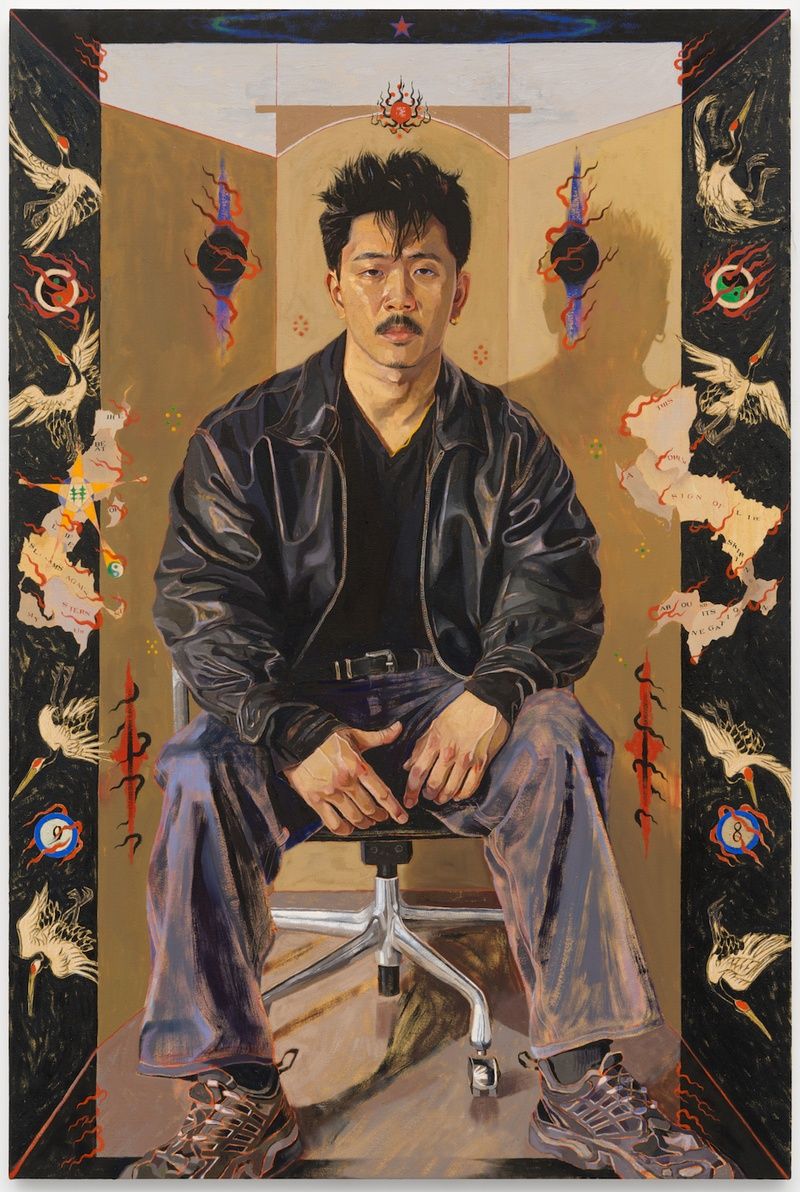
Oscar yi Hou
Self-portrait (25), aka: The beat of life, 2024
Oils, gouache, and colored pencil on canvas
54 × 36 × 1 inches
Works
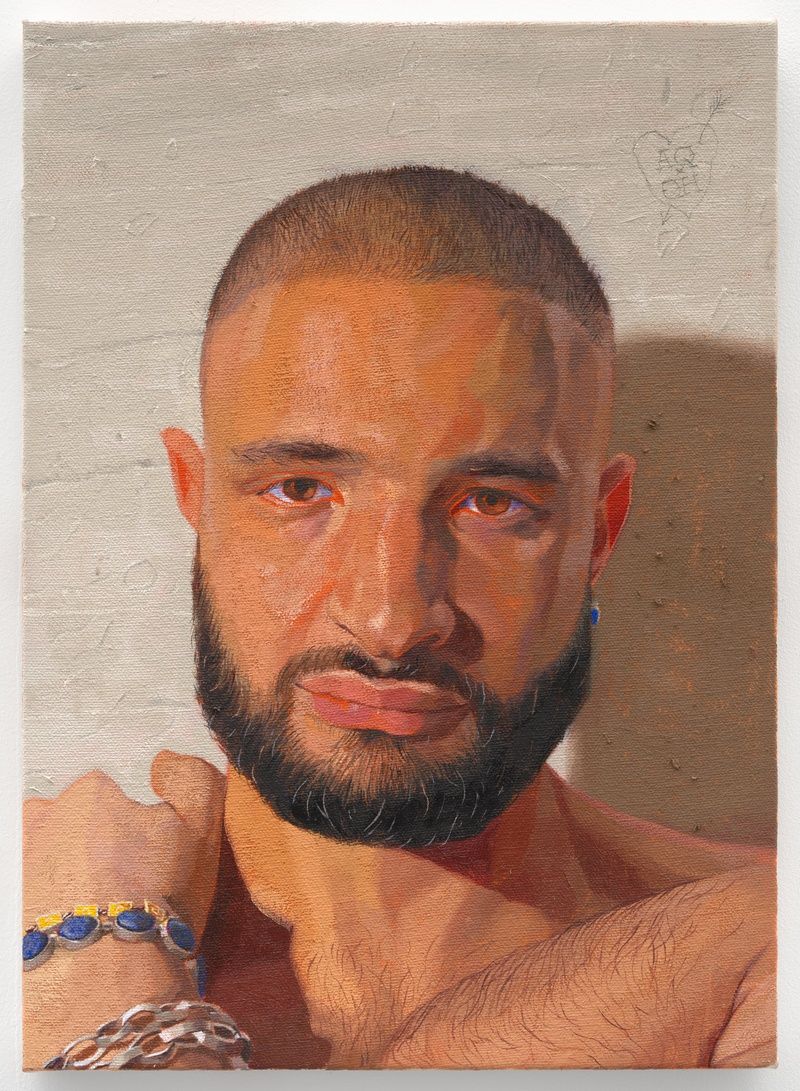
Habibi, aka: If you surrendered to air, you could ride it, 2024
Signed and dated verso
Oils and graphite on canvas
14 × 10 inches
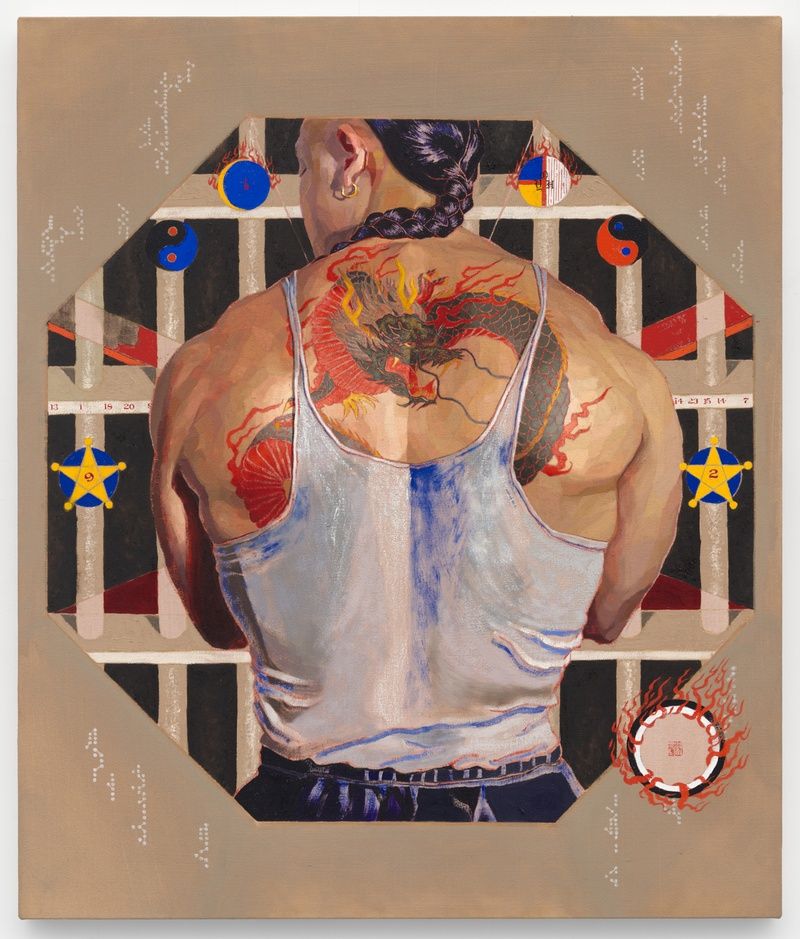
Coolieisms, aka: The Geary Act’s Rough Trade, 2023
Signed and dated recto
Oils, gouache, colored pencil, oil stick, and dry transfer lettering on canvas
33 × 28 × 1 inches
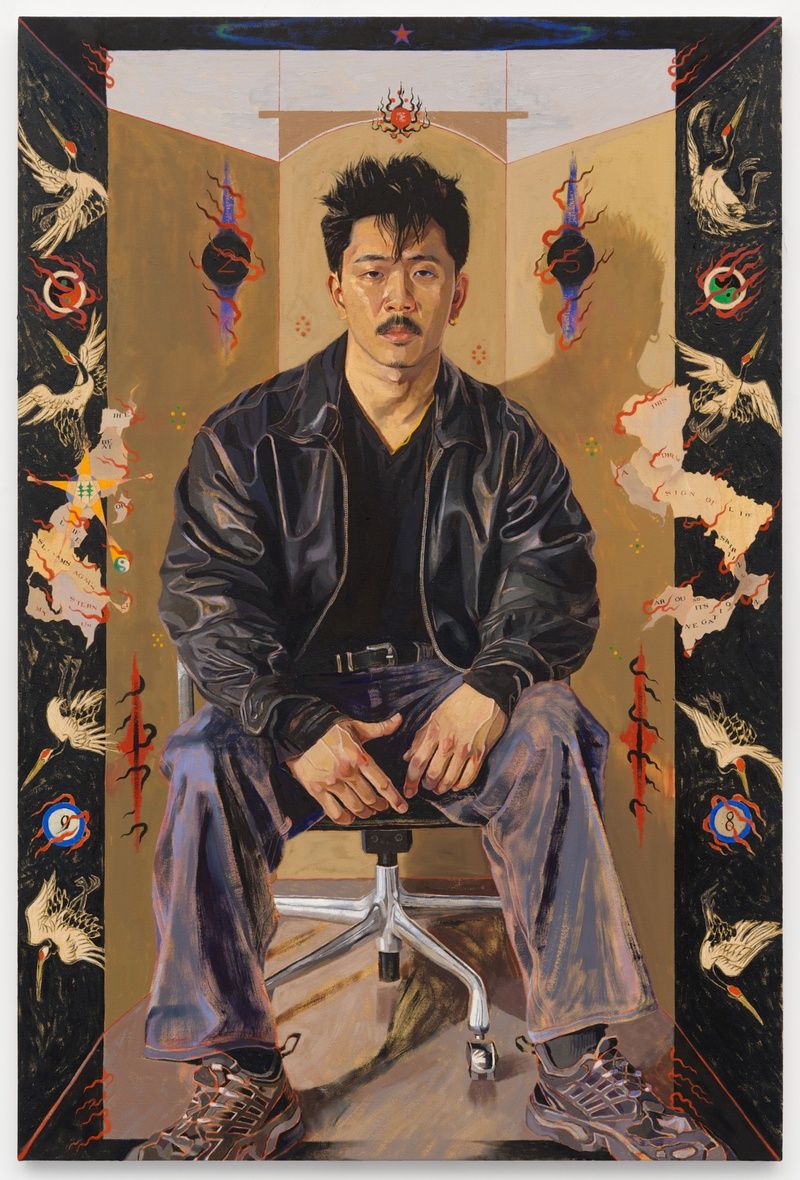
Self-portrait (25), aka: The beat of life, 2024
Signed and dated recto
Oils, gouache, and colored pencil on canvas
54 × 36 × 1 inches
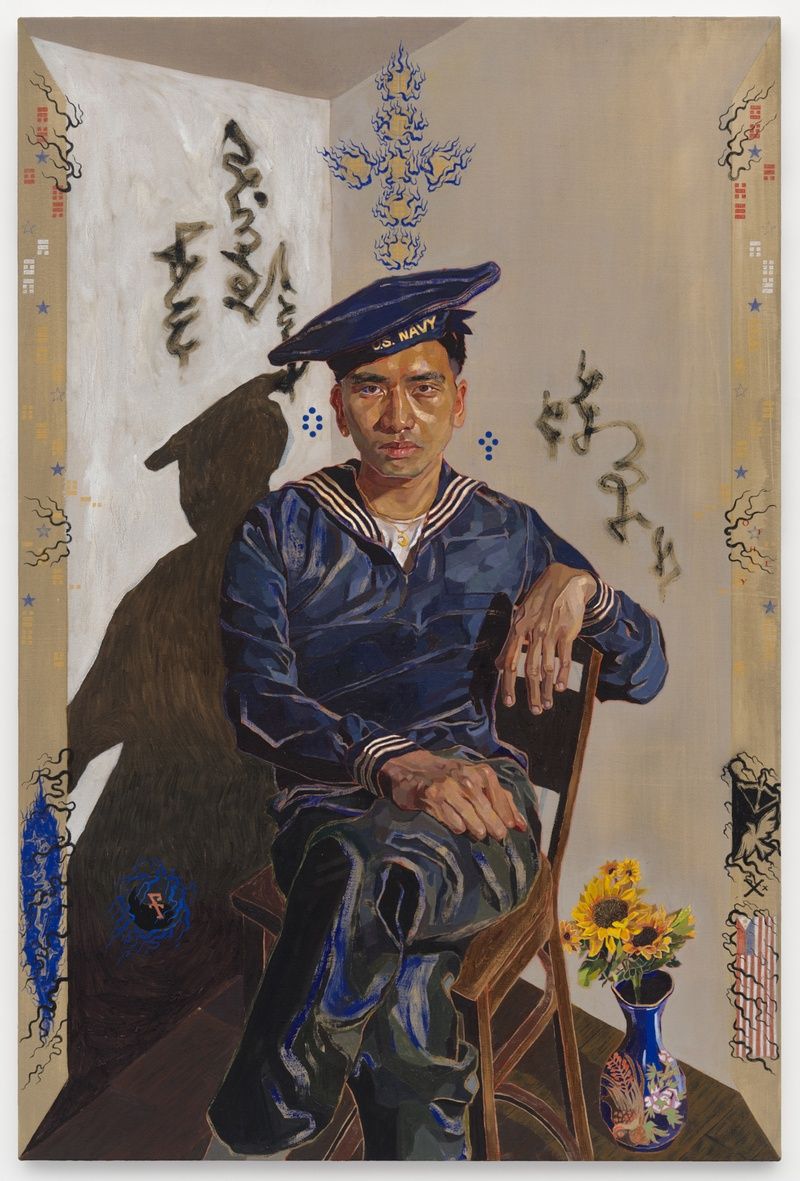
Sailor Moon Rising aka: Pacific Passenger, 2023
Signed and dated recto
Oils, gouache, colored pencil, oil stick, graphite, and dry transfer lettering on canvas
54 × 36 × 1 inches